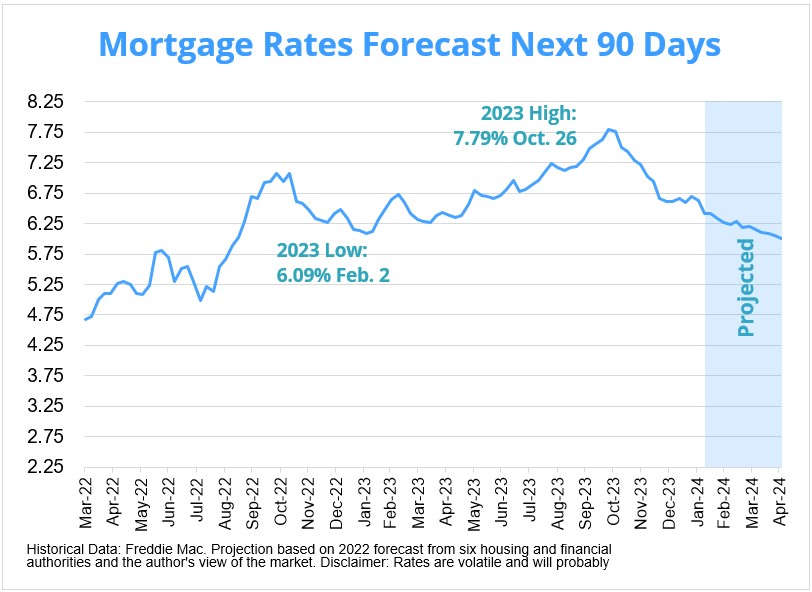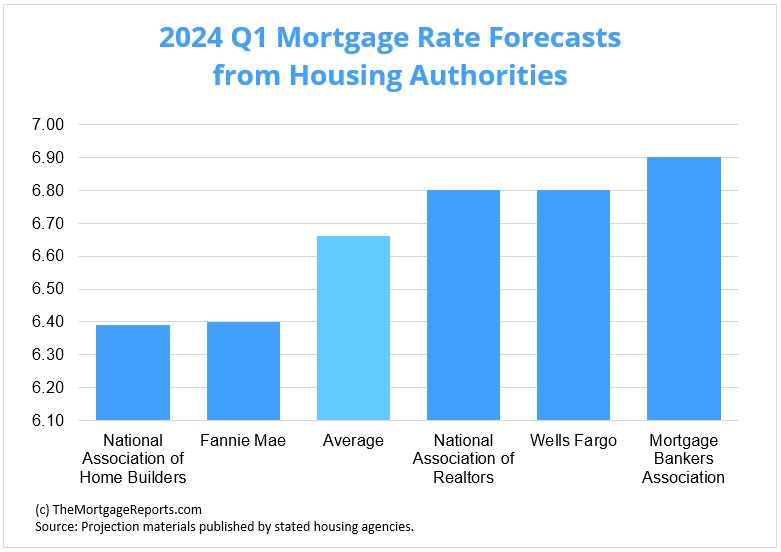Mortgage rate forecast for next week (March 11-15)
After four weeks of growth, mortgage rates offered borrowers some relief.
The average 30-year fixed rate mortgage (FRM) decreased from 6.94% on Feb. 29 to 6.88% on March 7, according to Freddie Mac.
“Mortgage rates ticked down this week, the latest move in a volatile market where investors are closely monitoring economic and inflation data – and the Federal Reserve’s reaction to it,” said Orphe Divounguy, senior macroeconomist at Zillow Home Loans.
Find your lowest mortgage rate. Start hereIn this article (Skip to...)
- Will rates go down in March?
- 90-day forecast
- Expert rate predictions
- Mortgage rate trends
- Rates by loan type
- Mortgage strategies for March
- Mortgage rates FAQ
Will mortgage rates go down in March?
Mortgage rates fluctuated significantly in 2023, with the average 30-year fixed rate going as low as 6.09% on Feb. 2 and as high as 7.79% on Oct. 26, according to Freddie Mac.
Find your lowest mortgage rate. Start hereThe range can be largely attributed to the Federal Reserve’s ongoing fight against inflation, juxtaposed with uncertainty in the banking sector sparked by Silicon Valley Bank’s collapse. However, with duress permeating the financial market and the fallout from U.S. debt ceiling talks, the Fed may continue making hikes to bring interest rates down.
With the economy possibly heading into a recession, we may have already seen the peak of this rate cycle. Of course, interest rates are notoriously volatile and could tick back up on any given week.
Experts from CoreLogic, Home Qualified, Realtor.com and others weigh in on whether 30-year mortgage rates will climb, fall, or level off in March.
Expert mortgage rate predictions for March

Craig Berry, branch manager at Acopia Home Loans
Prediction: Rates will moderate
“In their Jan. 31 meeting, the Fed opted to leave rates alone. According to the Federal Reserve, inflation is coming down faster than expected due to “a robust economy”. Even so, the Fed indicated they’ll need to see additional indicators that inflation has stabilized prior to making any rate cuts. This news didn’t help mortgage rates. Other than slight fluctuations, rates will remain relatively flat through the month of March.”

Molly Boesel, principal economist at CoreLogic
Prediction: Rates will moderate
“The Federal Reserve has taken a pause on interest rates as they monitor inflation, and those looking for decreases in rates will need to be patient. When inflation approaches the Fed target, rates should start to decrease. Until then, look for the 30-year mortgage rate to be in the high-6% range in March.”

Ralph DiBugnara, president at Home Qualified
Prediction: Rates will rise
“So far, the first quarter of 2024 has been very similar to the first quarter of 2023. Inflation has been up in some categories and made rates move more upward than downward. Rates came down at the end of 2023 but the most recent Fed meeting should sign that there won’t be any rate cuts until summer 2024. I believe that lack of commitment to cut or raise by the Fed will keep the market guessing and we will see averages creep up some. The 30-year fixed rate will average 7.25% in March while the 15-year fixed will average 6.75%.”

Selma Hepp, chief economist at CoreLogic
Prediction: Rates will moderate
“The US economy continues to show signs of strength, so therefore, rates are likely to remain stable through the spring home buying season, with cuts not expected until the beginning of summer. However, in recent industry surveys, home buyers are beginning to feel optimistic about where rates are heading and more and more home buyers are anticipating rates to decline through the year.”

Hannah Jones, senior economic research analyst at Realtor.com
Prediction: Rates will moderate
“Mortgage rates are likely to remain steady through March, dependent on incoming economic data. At the February FOMC meeting, Chair Powell emphasized that it is unlikely that we will see a rate cut in March as incoming economic data remains fairly strong. Later the same week, January employment data came in well above expectation with the economy adding 353,000 net new jobs in the month. The still-strong employment data demonstrated that slowing the economy may not be a straight path, and prolonged contractionary policy may be necessary. Mortgage rates are likely to remain in the mid to high 6% for the time being until slowing inflation shifts investor expectations and the Fed starts to cut interest rates.”

Jess Kennedy, COO at Beeline
Prediction: Rates will moderate
“We predict that rates will hold relatively steady in March. The Fed has signaled pretty strongly that they are in a holding pattern right now. We may see slight fluctuations but generally, we don’t expect much movement. The 10-year bond and 30-year mortgage rate spread continues to be pretty large and we don’t anticipate that to change any time soon since the Federal Reserve is no longer buying MBS, so the demand for MBS is lower.”

Odeta Kushi, deputy chief economist at First American
Prediction: Rates will moderate
“The average 30-year fixed mortgage rate has fallen in recent months, but ticked up again recently due to strong economic and labor market data. Initial optimism for Federal Reserve rate cuts was tempered after recent data, prompting the increase in mortgage rates. Traders have now ruled out a March rate cut, yet May could still see a reduction. This suggests potential mortgage rate volatility ahead, dependent on future economic data. Should this economic data exceed expectations, rates may rise further. Nonetheless, ongoing deceleration in inflation fuels cautious optimism for a general decline in mortgage rates in 2024, especially in the latter half of the year.”

Rick Sharga, CEO at CJ Patrick Company
Prediction: Rates will moderate
“The consensus is that the Federal Reserve will hold steady at its March meeting, neither raising nor cutting the Fed Funds Rate. Mortgage rates on 30-year fixed rate loans in March will likely do the same, neither rising or declining very much, staying in a fairly narrow band between 6.5-7.0%, fluctuating with reports on various economic metrics.
The sudden dip in rates in the month of January appears to have been an overreaction by the market to language from the Fed that was interpreted as a sign of rate cuts as early as the first quarter. With that increasingly unlikely to happen, we’ve seen mortgage rates inch back up, and are likely to see them zig zag in a gradually downward direction for the rest of the year, but not drop meaningfully until the first rate cut by the Fed actually happens.”

Charles Williams, CEO at Percy
Prediction: Rates will moderate
“In a recent interview on 60 Minutes, Fed Chair Jerome Powell gave a strong indication that they won’t be cutting rates before the economy hits the target rates of 2%. With jobs numbers still very strong, it’s not likely we’ll see a rate cut until March, perhaps even May. And even then, it will be a slow and gradual pullback, so we’ll be lucky to dip below 6% mortgage rates by the end of the year.”
Mortgage interest rates forecast next 90 days
As inflation ran rampant in 2022, the Federal Reserve took action to bring it down and that led to the average 30-year fixed-rate mortgage spiking in 2023.
With inflation gradually cooling, the Fed adjusted its policies with skipped hikes and cuts are expected this year. Additionally, the economy showing signs of slowing has many experts believing mortgage interest rates will gradually descend in 2024.
Find your lowest mortgage rate. Start hereOf course, rates could rise on any given week or if another global event causes widespread uncertainty in the economy.

Mortgage rate predictions for 2024
The 30-year fixed-rate mortgage averaged 6.88% as of March 7, according to Freddie Mac. Four of the five major housing authorities we looked at project 2024’s first quarter average to finish below that.
The National Association of Home Builders sits at the low end of the group, predicting the average 30-year fixed interest rate to settle at 6.39% for Q1. Meanwhile, the Mortgage Bankers Association had the highest forecast of 6.9%.
| Housing Authority | 30-Year Mortgage Rate Forecast (Q1 2024) |
| National Association of Home Builders | 6.39% |
| Fannie Mae | 6.40% |
| National Association of Realtors | 6.80% |
| Wells Fargo | 6.80% |
| Mortgage Bankers Association | 6.90% |
| Average Prediction | 6.66% |

Current mortgage interest rate trends
Mortgage rates dropped after fourth consecutive weeks of increases.
The average 30-year fixed rate fell from 6.94% on Feb. 29 to 6.88% on March 7. The average 15-year fixed mortgage rate similarly decreased from 6.26% to 6.22%.
Get started shopping for mortgage rates| Month | Average 30-Year Fixed Rate |
| February 2023 | 6.26% |
| March 2023 | 6.54% |
| April 2023 | 6.34% |
| May 2023 | 6.43% |
| June 2023 | 6.71% |
| July 2023 | 6.84% |
| August 2023 | 7.07% |
| September 2023 | 7.20% |
| October 2023 | 7.62% |
| November 2023 | 7.44% |
| December 2023 | 6.82% |
| January 2024 | 6.64% |
| February 2024 | 6.78% |
Source: Freddie Mac
After hitting record-low territory in 2020 and 2021, mortgage rates climbed to a 23-year high in 2023. Many experts and industry authorities believe they will follow a downward trajectory into 2024. Whatever happens, interest rates are still below historical averages.
Dating back to April 1971, the fixed 30-year interest rate averaged around 7.8%, according to Freddie Mac. So if you haven’t locked a rate yet, don’t lose too much sleep over it. You can still get a good deal, historically speaking — especially if you’re a borrower with strong credit.
Just make sure you shop around to find the best lender and lowest rate for your unique situation.
Mortgage rate trends by loan type
Many mortgage shoppers don’t realize there are different types of rates in today’s mortgage market. But this knowledge can help home buyers and refinancing households find the best value for their situation.
Find your lowest mortgage rate. Start hereWhich mortgage loan is best?
The best mortgage for you depends on your financial situation and your goals.
For instance, if you want to buy a high-priced home and you have great credit, a jumbo loan is your best bet. Jumbo mortgages allow loan amounts above conforming loan limits, which max out at $ in most parts of the U.S.
On the other hand, if you’re a veteran or service member, a VA loan is almost always the right choice. VA loans are backed by the U.S. Department of Veterans Affairs. They provide ultra-low rates and never charge private mortgage insurance (PMI). But you need an eligible service history to qualify.
Conforming loans and FHA loans (those backed by the Federal Housing Administration) are great low-down-payment options.
Conforming loans allow as little as 3% down with FICO scores starting at 620. FHA loans are even more lenient about credit; home buyers can often qualify with a score of 580 or higher, and a less-than-perfect credit history might not disqualify you.
Finally, consider a USDA loan if you want to buy or refinance real estate in a rural area. USDA loans have below-market rates — similar to VA — and reduced mortgage insurance costs. The catch? You need to live in a ‘rural’ area and have moderate or low income to be USDA-eligible.
Mortgage rate strategies for March 2024
Mortgage rates displayed their famous volatility in 2023. Uncertainty in the banking sector led to downtrends, but ongoing inflation battles, Fed hikes and a hot job market drove growth.
Find your lowest mortgage rate. Start hereThe central bank held off on a rate hike in its past four meetings, preferring to see if the economy would keep cooling organically. At the most recent meeting in January, the FOMC projected cuts starting as early as May. As always, the committee said it would adjust its policies as necessary — which could mean additional hikes or possibly none at all.
Here are just a few strategies to keep in mind if you’re mortgage shopping in the coming months.
Be ready to move quickly
Indecision can lead to failure or missed opportunities. That holds true in home buying as well.
Although the housing market is becoming more balanced than the recent past, it still favors sellers. Prospective borrowers should take the lessons learned from the last few years and apply them now even though conditions are less extreme.
“Taking too long to decide to make an offer can lead to paying more for the home at best and at worst to losing out on it entirely. Buyers should get pre-approved (not pre-qualified) for their mortgage, so that the seller has some certainty about the deal closing. And be ready to close quickly — a long escrow period will put you at a disadvantage.
And it’s definitely not a bad idea to work with a real estate agent who has access to “coming soon” properties, which can give a buyer a little bit of a head start competing for the limited number of homes available,” said Rick Sharga.
Buyer demand is lower than a typical year, but the market usually heats up in spring and summer. Being decisive (and prepared) should only play to your advantage.
Shopping around isn’t only for the holidays
Since interest rates can vary drastically from day to day and from lender to lender, failing to shop around likely leads to money lost.
Lenders charge different rates for different levels of credit scores. And while there are ways to negotiate a lower mortgage rate, the easiest is to get multiple quotes from multiple lenders and leverage them against each other.
“For potential home buyers, it’s important to get quotes from multiple lenders for a mortgage, as rates can vary dramatically, especially during such a volatile period,” said Odeta Kushi.
As the mortgage market slows due to lessened demand, lenders will be more eager for business. While missing out on the rock-bottom rates of 2020 and 2021 may sting, there’s always a way to use the market to your advantage.
How to shop for interest rates
Rate shopping doesn’t just mean looking at the lowest rates advertised online because those aren’t available to everyone. Typically, those are offered to borrowers with great credit who can put a down payment of 20% or more.
The rate lenders actually offer depends on:
- Your credit score and credit history
- Your personal finances
- Your down payment (if buying a home)
- Your home equity (if refinancing)
- Your loan-to-value ratio (LTV)
- Your debt-to-income ratio (DTI)
To figure out what rate a lender can offer you based on those factors, you have to fill out a loan application. Lenders will check your credit and verify your income and debts, then give you a ‘real’ rate quote based on your financial situation.
You should get three to five of these quotes at a minimum, then compare them to find the best offer. Look for the lowest rate, but also pay attention to your annual percentage rate (APR), estimated closing costs, and ‘discount points’ — extra fees charged upfront to lower your rate.
This might sound like a lot of work. But you can shop for mortgage rates in under a day if you put your mind to it. And shaving just a few basis points off your rate can save you thousands.
Compare mortgage and refinance rates. Start here
Mortgage interest rate FAQ
Current mortgage rates are averaging 6.88% for a 30-year fixed-rate loan and 6.22% for a 15-year fixed-rate loan, according to Freddie Mac’s latest weekly rate survey. Your individual rate could be higher or lower than the average depending on your credit score, down payment, and the lender you choose to work with, among other factors.
Mortgage rates could decrease next week (March 11-15, 2024) if the mortgage market takes a cautious approach to a possible recession. However, rates could rise if lenders account for the Federal Reserve taking measures to counteract inflation or if a global event brings economic uncertainty.
If inflation continues to dissipate and the economy cools or goes into a recession, it’s likely mortgage rates will decrease in 2024. Although, it’s important to remember that interest rates are notoriously volatile and are driven by many factors, so they can rise during any given week.
Mortgage rates may continue to rise in 2024. High inflation, a strong housing market, and policy changes by the Federal Reserve have all pushed rates higher in 2022 and 2023. However, if the U.S. does indeed enter a recession, mortgage rates could come down.
Freddie Mac is now citing average 30-year rates in the 7% range. If you can find a rate in the 5s or 6s, you’re in a very good position. Remember that rates vary a lot by borrower. Those with perfect credit and large down payments may get below-average interest rates, while poor-credit borrowers and those with non-QM loans could see much higher rates. You’ll need to get pre-approved for a mortgage to know your exact rate.
For the most part, industry experts do not expect the housing market to crash in 2023. Yes, home prices are over-inflated. But many of the risk factors that led to the 2008 crash are not present in today’s market. Low inventory and massive buyer demand should keep the market propped up next year. Plus, mortgage lending practices are much safer than they used to be. That means there’s not a subprime mortgage crisis waiting in the wings.
At the time of this writing, the lowest 30-year mortgage rate ever was 2.65%. That’s according to Freddie Mac’s Primary Mortgage Market Survey, the most widely used benchmark for current mortgage interest rates.
Locking your rate is a personal decision. You should do what’s right for your situation rather than trying to time the market. If you’re buying a home, the right time to lock a rate is after you’ve secured a purchase agreement and shopped for your best mortgage deal. If you’re refinancing, you should make sure you compare offers from at least three to five lenders before locking a rate. That said, rates are rising. So the sooner you can lock in today’s market, the better.
That depends on your situation. It’s a good time to refinance if your current mortgage rate is above market rates and you could lower your monthly mortgage payment. It might also be good to refinance if you can switch from an adjustable-rate mortgage to a low fixed-rate mortgage; refinance to get rid of FHA mortgage insurance; or switch to a short-term 10- or 15-year mortgage to pay off your loan early.
It’s often worth refinancing for 1 percentage point, as this can yield significant savings on your mortgage payments and total interest payments. Just make sure your refinance savings justify your closing costs. You can use a mortgage calculator or speak with a loan officer to crunch the numbers.
Start by choosing a list of three to five mortgage lenders that you’re interested in. Look for lenders with low advertised rates, great customer service scores, and recommendations from friends, family, or a real estate agent. Then get pre-approved by those lenders to see what rates and fees they can offer you. Compare your offers (Loan Estimates) to find the best overall deal for the loan type you want.
What are today’s mortgage rates?
Mortgage rates are rising, but borrowers can almost always find a better deal by shopping around. Connect with a mortgage lender to find out exactly what rate you qualify for.
Time to make a move? Let us find the right mortgage for you1Today's mortgage rates are based on a daily survey of select lending partners of The Mortgage Reports. Interest rates shown here assume a credit score of 740. See our full loan assumptions here.
Selected sources:
- https://www.blackknightinc.com/category/press-releases
- https://www.federalreserve.gov/monetarypolicy/fomccalendars.htm
- http://www.freddiemac.com/research/datasets/refinance-stats/index.page
